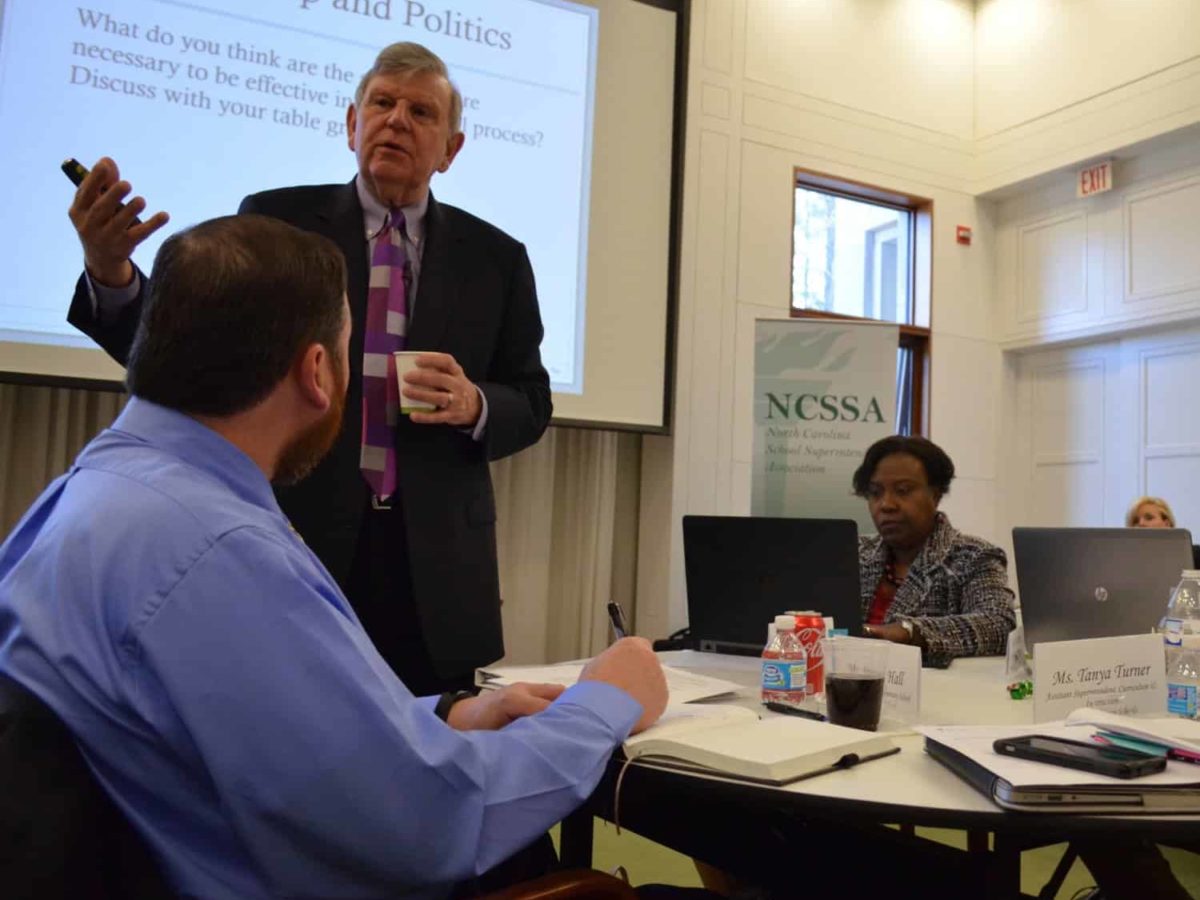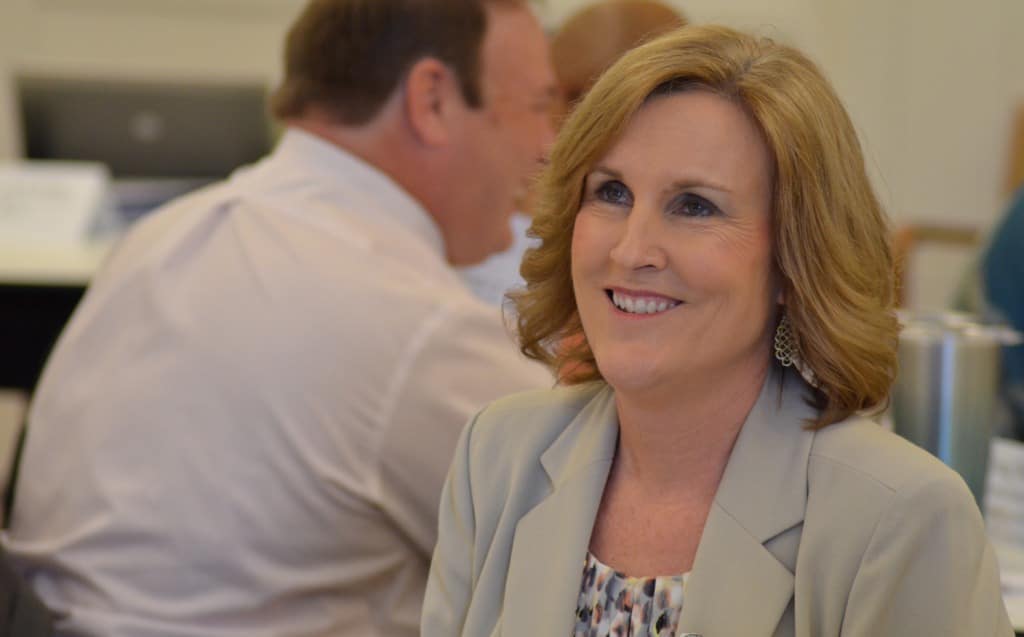

Steve Hall’s journey to become an education leader was not easy or short. Before he roamed the halls of Piney Creek Elementary School in Alleghany County as its principal, he mopped floors and cleaned bathrooms for a living. For eight and a half years, he was a custodian by day while studying at night to become a teacher. From those humble beginnings, he rose through the education ranks, and last week he sat in a room at the Burroughs Wellcome Fund in Research Triangle Park learning the skills he would need for the next step: becoming a district superintendent.
“It has been a long road, but this program is one of the best programs that I’ve taken part in,” he said.
The Aspiring Superintendent Program is the latest offering from the North Carolina School Superintendents Association (NCSSA). The organization has trained superintendents through other programs for years. Through its Next Generation Superintendent Development Program, NCSSA taught new superintendents how to come into their role ready to lead school districts around the state. But NCSSA Executive Director Jack Hoke was not content just molding the rising crop of district leaders. He also wanted to get at the next group — the ones who might not even know they would one day become superintendents.
“I just felt like there was a huge need for a program to help folks get prepared,” he said. “And this program is designed to support the growth, expansion and enhancement of school and district leaders in the leadership positions they are currently occupying while providing high quality professional development to increase their knowledge and base of skills and dispositions needed to be a future superintendent.”
Part of the impetus for the program also came from the high rate of turnover among district superintendents. Hoke said the state is averaging a 23 percent turnover rate each year.
The 34 education leaders at the training represented the first cohort of the Aspiring Superintendent Program. To find them, Hoke sent out messages to superintendents around the state asking them to nominate people to take the course which is held in three two-day sessions over a period of a few months. He initially only wanted 25 people, but 34 applied so he took them all.
In the program, they learn a variety of skills that will prepare them if they ever move forward to become superintendent. Participants took crash courses in district finance, strategic planning, maintaining good relationships with local schools boards, and even navigating the choppy political waters of state education.
Larry Coble, president of On Track Press — an organization specializing in educator leadership and development — spent most of a day teaching the program’s attendees how to sharpen their political acumen.
“The big picture is, as a school superintendent everybody is wanting something from you or the school district,” Coble said.
He taught them about how to develop allies to move their political agendas forward. He also explained to them that in their roles as superintendents, they will need to negotiate to achieve their agendas. And that means knowing their core values and knowing when to compromise.
“The bottom line is we have to draw a line in the sand … we have to look inside ourselves and know what we’re wiling to give up and what we won’t give up,” Hall said during a break in Coble’s presentation.
Up until the point they become superintendents, education leaders can often survive on the skills they acquired over a career in the classroom, school hallway, or central office. But once they get the leadership position, they need new abilities, Coble said.
“The higher you move the more important people/interpersonal skills become and the less important technical skills become,” he said. “So this is all about ‘How do I cultivate and build relationships to enable me to assemble allies and networks and coalitions that will enable me to move the district forward?’”
Coble’s presentation and that of other experts is a large part of what happens at the Aspiring Superintendent Program, but the education leaders attending get something else too: a peer group for support. Hoke says that is one of the biggest advantages of the program.
“I think the best part of the program … is the networking and the opportunity to sit around and talk and learn from each other,” he said. “So it’s not just a sit-and-get. It’s a sit-and-get-and-do.”
Not everybody in the program will go on to become a superintendent. Some entered the program thinking they did not aspire to the role. Tanya Turner, assistant superintendent in Edenton-Chowan Schools, said the program changed her mind.
“I honestly came into this thinking that this is something I did not want to do. I came because my superintendent wanted me to,” she said. “Cause he sees me in this role where I didn’t see me in this role. I’m so passionate about curriculum and instruction that I didn’t see how I could still lead that effort and be a superintendent at the same time.”


By attending the Aspiring Superintendent Program, she said she now sees a way forward.
“I realize that I think you can do both at the same time. I think it’s about using your strengths to lead your district and surrounding yourself with people who embody the strengths that maybe you don’t have,” she said, “so that you can still do what you’re passionate about doing … while at the same time moving your district forward in those other areas as well.”
Patricia Hollingsworth, chief public information officer for Nash-Rocky Mount Public Schools, said she thinks the program will help her in her current role as well.
“The main focus was to grow me as a leader,” she said. “So I feel like I’m adding to my toolbox and I’m sharpening myself, so that whenever I go back to my district, I’m able to strategize and offer suggestions to high-level administration as it relates to running our school system.”
Hoke said he was especially proud of this first cohort of the Aspiring Superintendent Program, and he credits attendees’ participation.
“I’ve been in this business 42 years, and this program has been as meaningful and successful as any I’ve ever been involved in,” he said. “Because of the group we’ve got assembled here.”


